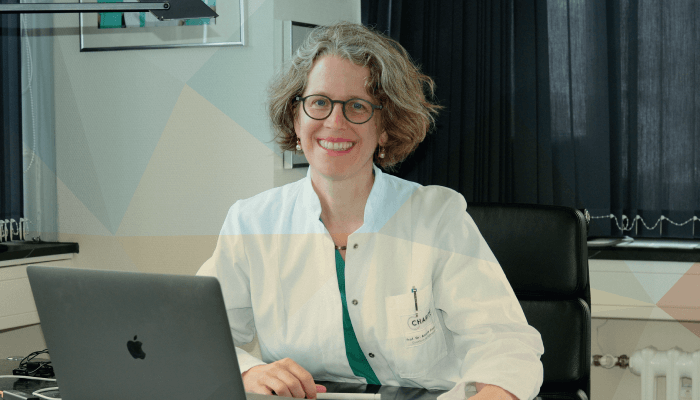
If you weren’t an ophthalmologist, what would you do?
I would have loved to study music – I played the organ and the piano when I was young. If I were to choose another medical specialty, it would have been oncology. When I had my final year rotations in an oncology ward in the 1990s, I was very excited to see how stem cell transplantations were implemented into clinical practice. I actually learned a lot for my basic research, which still looks at macrophages and microglia cells.
So why did you choose ophthalmology?
I was introduced to the specialty very early; my father was an ophthalmologist! He was training with Gerd Meyer-Schwickerath in Essen, Germany, when I was born. Later, he set up a private practice, and we visited him almost every day. Consequently, I spent many hours in an ophthalmic practice as a child, so ophthalmology became a natural thing to me.
During medical school, I saw the first phacoemulsification procedures performed by Hans-Reinhard Koch in Bad Godesberg. It was thrilling to observe such a fast and efficient way to restore a patient’s vision – and improve their quality of life. Later, I was fascinated with vitreoretinal surgery when working with Bernd Kirchhof in Cologne. I have never regretted following in his footsteps. Ophthalmology is my life-long fascination, as is vascular research. I’d like to encourage my colleagues at the start of their careers to “lean in” – keep their focus on what excites them the most, and stick to it.
Who would you list as your most important mentors?
In Heidelberg, I started my PhD thesis with Friedrich Kruse, a corneal specialist, who had just returned from a fellowship at Bascom Palmer in Florida, USA. We worked on corneal neovascularization. When I did my own fellowship in Boston, I had the pleasure of working with Anthony P. Adamis in Judah Folkman’s lab at the Boston Children’s Hospital. It was the most productive time in my life.
What made you choose retina and ocular oncology as your sub-specialties?
I already mentioned the impact of Bernd Kirchhof at the University of Cologne on my interests in vitreoretinal surgery.
Later, I was fortunate to receive Norbert Bornfeld’s (Essen University Hospital) friendship and guidance in ocular oncology. When I came to Berlin, my focus was vitreoretinal surgery. I was given the task of merging two ophthalmology departments, one belonging to the former Freie University, and the other to Humboldt University. Under my predecessor, the department of Freie University had become one of the two specialist ocular oncology departments in Germany.
I have big hopes for our field of expertise. My ultimate dream for this field is the discovery of a more specific molecular approach for treating choroidal melanoma. Right now, my team is working on systemic medicine approaches to metabolic eye disease (diabetic retinopathy) to gain knowledge from combining molecular, functional, and structural measures.
Why has research been such an important part of your career?
Without basic research there would never be any improvement in the understanding of diseases. The knowledge that we gained in the first rodent experiments with anti-VEGF or angiopoietins is now helping millions of patients with vascular diseases of the retina or age-related macular degeneration.
What is your proudest achievement?
It has to be the combined successes of my former and current team members – in Berlin and formerly in the lab in Cologne, and the Department of Ophthalmology in Düsseldorf. Ten of my coworkers have already finished their Habilitation – a comprehensive thesis required to become a faculty member – while others have gained good independent positions elsewhere. It is fun working with them in all the diverse areas of ophthalmology.
What about your own clinical practice?
In ocular oncology you always remember patients with the most difficult manifestations of the disease, such as tumor endoresections, when we can maintain eye-sight and even in some patients maintain some visual acuity. One of my particular interests is in retinal vascular disease, so I treat a lot of children with Coats’ disease and familial exudative vitreoretinopathy (FEVR); it is a great pleasure to observe their development over many years.
Do you appreciate working as part of a diverse team?
I had the chance to do a four-month elective internship at Moorfields Eye Hospital in London, UK, during my last year of medical school, and I enjoyed the international feel of that working environment, as did I later on in Boston. Our team in Berlin is also very diverse, with members from many European countries and abroad. We also try to maintain equal gender proportions, which so far has worked out well on all levels.
And do you still play the piano?
I actually picked it up again after almost 30 years! Interestingly, there are several good pianists in ophthalmology… I would like the opportunity to play a four hands duet with Tara McCannel – an ocular oncology expert from UCLA.
How has your life changed during the COVID-19 pandemic?
We have been able to do about 80 percent of our normal surgical load, and outpatient clinics see similar patient numbers. We maintain hygiene and distance rules, and use masks and other protective equipment for patients and personnel. I believe we will have to stick to the relatively strict hygiene rules for a rather long time...
